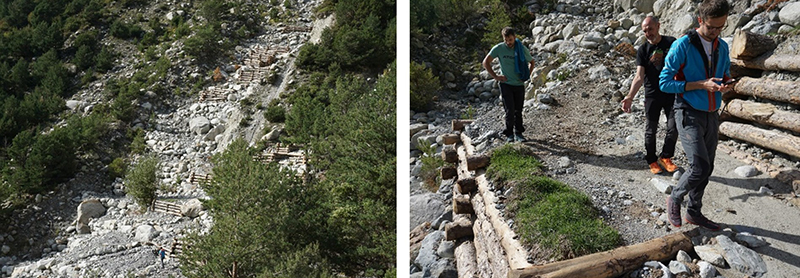PHUSICOS: "According to Nature" is a project that aims to demonstrate that nature-based and nature-inspired solutions to reduce the risks associated with extreme weather events, especially in vulnerable areas such as rural mountain areas, are technically feasible, cost-effective and regionally applicable.
The Pyrenees Working Community (PWC) has the mission to reach out to local communities in the mountainous areas of the Pyrenees to engage in a dialogue with the most vulnerable local communities to jointly plan strategies, funding schemes, monitoring systems, policies and services related to nature-based solutions.
In addition to the CTP, other partners in this project include the Norwegian Geotechnical Institute (NGI) (lead partner), the University of Naples Federico II (UNINA), the French Geological Survey (BRGM), the University of Vienna (UNIVIE), the University of Salzburg (PLUS), Risques et Développement (RD) in France, the GeoTechnologies Centre of the University of Siena (UNISI), the University of Geneva (UNIGE), the International Institute for Applied Systems Analysis (IIASA), the Chair of Strategic Landscape Planning and Management at the Technical University of Munich (TUM), CREAF, Agencenter, the Oppland County Authority and the Serchio River Basin Authority.
Learn more about the the PHUSICOS demonstrative cases in the Pyrenees here:
Here, landslides and rockslides from a steep slope, about 35 m high, formed by loose till glacier, threaten a major road between France and Spain, the A-136 (RD-934 in France). There are often fallen rocks and debris on the road, and visibility for cars coming from both directions is low due to the curves, and speeds are often high. The location has been identified as a high risk point on this road. The increased frequency of heavy rainfall events may increase the danger.


Snow avalanches in the forest of Capet, in the village of Barèges, France.
The village of Barèges, a major tourist destination, has been affected on several occasions by snow avalanches from the mountainside to the north of the village. The village, which is part of the Grand Tourmalet ski destination and also has thermal baths, was evacuated due to avalanche danger as early as 2013 and 2015.
In recent years, several avalanche slopes have been created on the valley side, where anti-avalanche infrastructures in the form of fences, stone and concrete barriers have been installed. Some of these structures were built in the 19th century. Although many of them are still functional, during extreme winters the existing fences are buried by snow, with the risk of snow slides through the fences. This was the case during the last avalanche that reached the village. In addition, these infrastructures require extensive maintenance, which must be carried out on foot and is therefore very laborious.

The village of Erill-la-Vall in the Spanish Pyrenees is heavily affected by debris flow problems, where sediment is fed by tributary streams and flows into a main debris flow channel leading to the village. The source area consists of thick (>50 m) glacial till deposits. Annual rainfall in the area is about 1100 mm/year, mainly in autumn and spring. However, heavy rainfall in July-August seems to have the worst effect on the debris flow potential.

Visit HERE the official website of the project
Visit HERE more audiovisual contents of the project
PYRENEAN CLIMATE CHANGE OBSERVATORY
Avenida Nuestra Señora de la Victoria, 8
22.700 - Jaca
Huesca - España
+34 974 36 31 00
info_opcc@ctp.org





